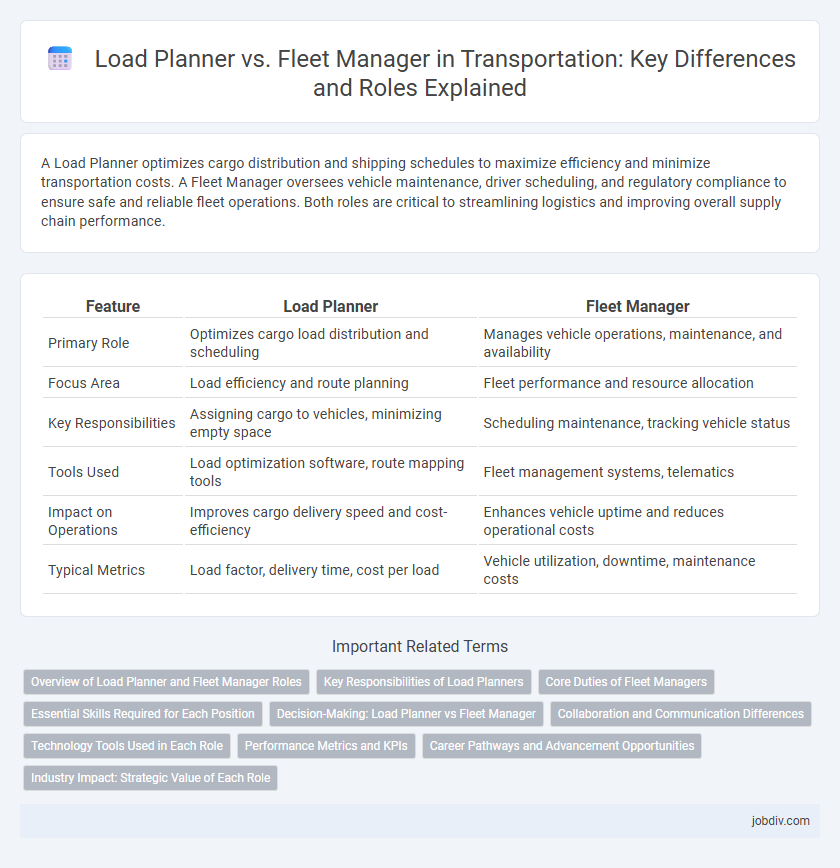A Load Planner optimizes cargo distribution and shipping schedules to maximize efficiency and minimize transportation costs. A Fleet Manager oversees vehicle maintenance, driver scheduling, and regulatory compliance to ensure safe and reliable fleet operations. Both roles are critical to streamlining logistics and improving overall supply chain performance.
Table of Comparison
| Feature | Load Planner | Fleet Manager |
|---|---|---|
| Primary Role | Optimizes cargo load distribution and scheduling | Manages vehicle operations, maintenance, and availability |
| Focus Area | Load efficiency and route planning | Fleet performance and resource allocation |
| Key Responsibilities | Assigning cargo to vehicles, minimizing empty space | Scheduling maintenance, tracking vehicle status |
| Tools Used | Load optimization software, route mapping tools | Fleet management systems, telematics |
| Impact on Operations | Improves cargo delivery speed and cost-efficiency | Enhances vehicle uptime and reduces operational costs |
| Typical Metrics | Load factor, delivery time, cost per load | Vehicle utilization, downtime, maintenance costs |
Overview of Load Planner and Fleet Manager Roles
Load Planners coordinate the efficient assignment of freight to carriers, optimizing shipment routes and schedules to maximize load capacity and reduce transportation costs. Fleet Managers oversee the maintenance, operation, and utilization of company vehicles, ensuring compliance with safety regulations and managing driver performance to enhance fleet productivity. Both roles require strategic planning and real-time decision-making to improve supply chain efficiency and customer satisfaction.
Key Responsibilities of Load Planners
Load planners coordinate shipments by optimizing cargo loads to maximize efficiency and minimize transportation costs while ensuring compliance with safety regulations. They analyze freight data, plan load sequences, and collaborate with carriers to arrange timely pickups and deliveries. Their role is crucial in reducing transit times and improving overall supply chain performance.
Core Duties of Fleet Managers
Fleet managers oversee the efficient allocation and maintenance of a company's vehicle fleet, focusing on route optimization, regulatory compliance, and cost control. They coordinate vehicle repairs, manage driver schedules, and ensure safety standards are met to maximize operational efficiency. Unlike load planners who concentrate on cargo distribution and load optimization, fleet managers handle the broader scope of fleet utilization and maintenance.
Essential Skills Required for Each Position
Load planners require strong analytical skills and proficiency in route optimization software to efficiently allocate cargo and maximize vehicle capacity. Fleet managers need exceptional leadership abilities and expertise in maintenance scheduling, regulatory compliance, and budget management to oversee vehicle performance and safety. Both roles demand excellent communication skills to coordinate with drivers, customers, and logistics teams effectively.
Decision-Making: Load Planner vs Fleet Manager
Load planners focus on optimizing shipment schedules, route efficiency, and load distribution to maximize carrier utilization and reduce transportation costs. Fleet managers oversee vehicle maintenance, driver performance, and compliance regulations to ensure operational readiness and safety. Both roles require data-driven decision-making, but load planners prioritize tactical route and load decisions, while fleet managers emphasize strategic asset management and regulatory adherence.
Collaboration and Communication Differences
Load Planners specialize in optimizing cargo distribution and sequencing to maximize space and meet delivery deadlines, relying heavily on real-time data and detailed shipment specifications. Fleet Managers oversee vehicle maintenance, driver scheduling, and overall fleet efficiency, requiring constant communication with drivers, maintenance teams, and load planners to ensure operational smoothness. Effective collaboration hinges on synchronized information exchange, where load planners provide precise load details and fleet managers communicate vehicle capabilities and constraints, enabling seamless transportation execution.
Technology Tools Used in Each Role
Load planners utilize route optimization software, GPS tracking systems, and advanced load matching algorithms to maximize cargo efficiency and reduce delivery times. Fleet managers employ telematics platforms, vehicle diagnostics tools, and maintenance management software to monitor fleet performance, ensure regulatory compliance, and minimize downtime. Both roles rely on integrated transportation management systems (TMS) to streamline operations and enhance real-time decision-making.
Performance Metrics and KPIs
Load planners optimize shipment efficiency by monitoring key performance indicators such as load utilization rate, on-time shipment percentage, and average load weight, directly impacting cost savings and delivery speed. Fleet managers focus on vehicle performance metrics including maintenance costs, fleet utilization rate, fuel efficiency, and driver compliance to ensure operational reliability and reduce downtime. Both roles use dashboard analytics to track metrics like turnaround time and cost per mile, aligning logistics performance with organizational goals.
Career Pathways and Advancement Opportunities
Load Planners focus on optimizing cargo distribution and coordinating shipments to enhance efficiency, often advancing into senior logistics or supply chain analyst roles. Fleet Managers oversee vehicle maintenance, driver management, and route planning, with career progression typically leading to operations director or transportation manager positions. Both career paths offer opportunities to develop strategic planning skills and move into executive roles within transportation and logistics companies.
Industry Impact: Strategic Value of Each Role
Load planners optimize cargo distribution and route planning to enhance shipment efficiency, directly reducing transportation costs and improving delivery times in the supply chain. Fleet managers oversee vehicle maintenance, driver scheduling, and compliance, ensuring operational reliability and safety across the fleet. Both roles strategically impact transportation by balancing resource utilization and service quality, driving overall industry competitiveness.
Load Planner vs Fleet Manager Infographic

 jobdiv.com
jobdiv.com